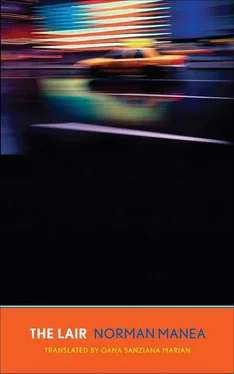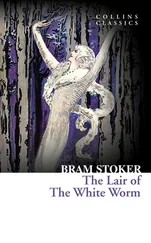“Now may I sit down?”
The professor makes a motion toward the chairs, the couch. He hadn’t noticed that they’d both been standing the whole time.
“Excuse me. I need to be at the office in fifteen minutes.”
He looks at his watch. Yes, fifteen minutes.
“Okay. I’ll come Saturday afternoon, as usual. Maybe, in the meantime, I’ll find another message in the mail. Something more explicit.”
Caspar looks at her, frowning.
“It wouldn’t be bad. Not bad at all.”
It sounded like a plea, or advice. He’d lost his humor. And it wasn’t midnight, just three in the afternoon.
“Have you thought about that phrase? I learned it, I know it by heart. It’s been in my head for a long time, I think. I’ve seen it before sometime, somewhere. I don’t know where. I’ve gotten old. I don’t remember.”
“You remember enough, too much. If it’s asleep in your memory, it will wake up. I know the phrase by heart, too. It doesn’t evoke any memories, however. I’m uncultured, just like my entire generation. Conspiracies amuse me.”
“We’ll talk on Tuesday, after Patrick’s interrogation. I’m in a hurry now.”
Peter’s in no hurry to get anywhere, the good-natured dialogue is putting him in a bad mood. He wants to go outside, to be alone. Tara retreats; the professor sets out apathetically toward campus. The wind is cold and wet. The library is warm and quiet. Books, magazines, newspapers from around the world. The sect of Saint Computer! At prayer, in front of the magic screen. Not even the Internet Generation, born from an electronic circuit instead of a woman’s womb, can retain the quotation. But Tara never found the magic button. If only there were some kind of a hypnosis to trigger the phosphorescent needle of memory’s magnet.
A fossil among the young servants to the God of Algorithms, that’s what I am, the professor decided, abandoning the temple.
Alone in his den. On the nightstand, under the pile of socks and tank tops, the yellow envelope. Tara’s old letter. Was that a different Tara, the one who was accusing professors of giving her too-high marks, while barely out of high school? A year ago, she’d confronted a professor who gave her a mark that was higher than what she’d expected. Now she was a gentle comrade. Was the past still part of the present?
In the envelope there was Tara Nelson’s essay on the novel Enemies: A Love Story. It had arrived a few days after her impertinent letter and after the end of the semester.
Unhappiness revolves around an inability to interact with unfamiliar circumstances. Losing old habits feels like losing the self. The solution isn’t to be found in the old habits, nor in a new identity, but in fantasy.
He’d read those pages on a July day, almost a year ago now. He’d discovered them, unexpectedly, in P.O. Box 1079.
Had Tara chosen the novel about the exiles to provoke him?
It isn’t possible both to remain in the old identity and to integrate into the new one.
Was that true? We are imperfect impostors at home and away from home, on Earth and on the moon.
From the war experience forward, the hero is receptive only to his own thoughts. The Christian woman who saved him and whom he is going to marry as a gesture of appreciation is an angelic Polish peasant woman, an illiterate saint, who, in the conversion to Judaism, becomes a sort of clown. The only escape from the real is the complicit relationship of mutual masochism, between the husband and the coreligionist, sexually voracious Masha.
What’s the connection to the threatening postcard? There’s no connection. No connection at all! Just the fact that both preoccupied him now, simultaneously.
The escape from the real, like sexual liberation. Mental fantasy connection. . the sex drive, the only labyrinth. Mental fantasy is their mutuality, physicality, sexual appetite, the only labyrinth that either of them can truly call his and her own.
Labyrinth?
A year ago, the word didn’t seem suspect. Now it has definition, phosphorescence, wile. Peter stops, asks himself what the woods have in store for the night, whether the patrol will be more discreet. He wants to sleep. The sex drive, the only labyrinth that either of them can truly call his and her own.
In the novel, the true enemy is memory, the trauma imposed on identity. The terms of the biography become the morbid impulse. To incorporate past trauma into the new system doesn’t require breaking down barriers, but rather to ignore its existence. To have a child, for example? Or to lose yourself in the labyrinth of sexuality?
Death. Lady Death! The Madame is gracing me with her imperial attention! Sleep, everlasting sleep, the somnolent Peter keeps repeating.
The red sky. The elephants on never-ending stilts. The insect-elephants, delicate cartilage. The astral giant from the prehistoric wilderness. Enormous, velvety mass, imperial tusks, indestructible ivory. Greenish silt draining from the trunk.
The female and male approaching, without ever getting close to one another. On the back of each, a carpet. On the carpet, the monument floating in air. On the trunk of the elephant on the left, an eye. On the female’s, the ocular globe is in between her lips, which are as red as a cosmetics ad.
Below, the infinite. Gray hills, the landing pad, the watch post, two forms running, with a flag and a torch.
The sky is orange then pink then red again. The elephants. A sky striped with thin legs ready to buckle. The arrows of transparent bone, bearing the weight of the bodies and their burdens and the vault. The blood of dawn. The stones are slipping from the Indian rug, they hang in the air. The painted eye. The eye of Special Agent Patrick. On the rug covering the quadruped’s spine, it says Patrick.
Sapped, Ga  par twists his body toward the nightstand, braces himself up in bed, props himself against the wall. The car brakes in front of his house. It’s not nighttime, but another day. Dawn, thank God! He’d slept for many hours, hadn’t heard the patrol until now.
par twists his body toward the nightstand, braces himself up in bed, props himself against the wall. The car brakes in front of his house. It’s not nighttime, but another day. Dawn, thank God! He’d slept for many hours, hadn’t heard the patrol until now.
The great volumes of the Encyclopedia Britannica. Thin pages, thin signs, the cryptograms of the past. The reader is pushed to the past that came before the past.
The Minotaur can’t be killed, the Old Man argues in the chapter about the labyrinth. The Minotaur finds vengeance, transforming the modern labyrinth into a hell. The Minotaur, the Taurus constellation. The promise of rebirth, spring. Futile annotations.
The telephone; the taxi driver can’t find the hermit’s cabin. It’s not the driver but Madame J.T. Peter has only just realized that the Vietnamese woman has an unnaturally low voice. The head of campus security wants to know whether the professor is going to spend the next few days on the grounds. Madame Tang alerts the dean about everything that goes on, who leaves campus, when, to return when, and in whose company.
No, Professor Ga  par won’t be on campus for the next few days; in fact, he was just waiting for the taxi to take him to the station. J.T. advises him to close his curtains before leaving, to leave the front light on, as if he were home. And especially, to let the college know in the future when he plans to leave and for how long.
par won’t be on campus for the next few days; in fact, he was just waiting for the taxi to take him to the station. J.T. advises him to close his curtains before leaving, to leave the front light on, as if he were home. And especially, to let the college know in the future when he plans to leave and for how long.
Deserted train station, no followers. An almost empty train car, no one but a hunched, pale old grandmother, sinking into a book, her spectacled grandson fidgeting nearby.
Did the mysterious postcard come from admirers of the Old Man, the alchemist? The encyclopedic scholar used to talk about the invisible fires of Hades, the underground world of the dead, the labyrinth of the cross, the bloodied thread of Ariadne, the knot as labyrinth. The labyrinth as initiation. The nomadic, exile, the underground. The serpentine maze made of a single line. The world captive in the modern tunnel, the tunnel of the subconscious? The Minotaur will devour the people from the tunnel! The Minotaur, in the invisible center of fatality, the scholar would say. The labyrinth made of a single, straight line is invisible. A single straight line, which is invisible.
Читать дальше

 par twists his body toward the nightstand, braces himself up in bed, props himself against the wall. The car brakes in front of his house. It’s not nighttime, but another day. Dawn, thank God! He’d slept for many hours, hadn’t heard the patrol until now.
par twists his body toward the nightstand, braces himself up in bed, props himself against the wall. The car brakes in front of his house. It’s not nighttime, but another day. Dawn, thank God! He’d slept for many hours, hadn’t heard the patrol until now.










